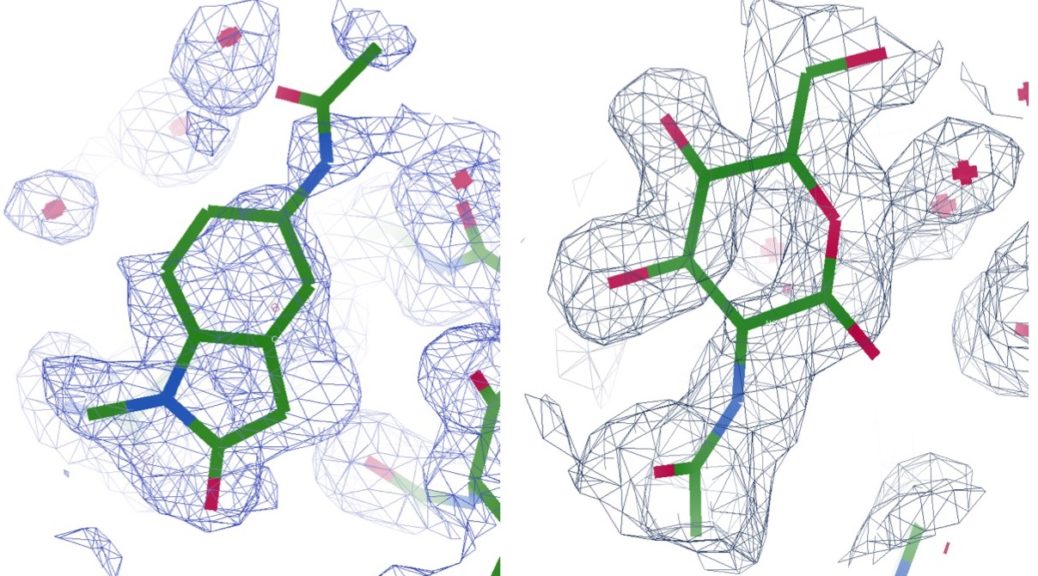
Electron density of fragments from crystal structures of protein-ligand complexes from fragment library screening
Our goal is to discover and develop novel inhibitors that will be broadly effective against SARS-CoV-2 and future SARS strains that will surely emerge.
DOYLESTOWN, Pa. and SAN FRANCISCO (PRWEB)
July 07, 2020
Accelero Biostructures (Accelero) and Mid-Atlantic BioTherapeutics (MABT) are pleased to announce our research collaboration to discover and develop novel coronavirus inhibitors for a broad range of coronaviruses (“pan-coronavirus inhibitors”). Accelero will use its novel and proprietary ABS-OneStepTM platform for high-throughput protein X-ray crystallography-based fragment screening as the hit generation engine for drug discovery. MABT will perform virologic testing and will also assume advanced development of the resulting compounds. In addition, the companies announced today that Accelero has been awarded additional funding from the National Institutes of Health (NIH) to support the discovery phase of this collaboration.
“Our partnership with MABT, and the funding support from NIH, will allow us to utilize our ABS-OneStepTM platform to discover novel chemical matter that targets both the current SARS-CoV-2, as well as potential future coronaviruses, given that COVID-19 is the third coronavirus pandemic or epidemic outbreak in the last 20 years”, said Debanu Das, Ph.D., Accelero Co-Founder and CEO. “After testing and validating ABS-OneStepTM on multiple diverse protein targets, we are now very excited to deploy our platform at this time of global need for novel anti-COVID-19 drug discovery,” said Ashley Deacon, Ph.D., Accelero Co-Founder and CSO.
MABT CEO David Horn, M.D. commented that “There is a clear unmet need for new treatments for this novel coronavirus, SARS-CoV-2, and our goal with this exciting collaboration with Accelero is to leverage their expertise and powerful ABS-OneStepTM platform to discover and develop novel inhibitors that will be broadly effective against SARS-CoV-2 and future SARS strains that will surely emerge.”
About Accelero
Accelero Biostructures (accelerobio.com) was founded in 2015 to capitalize on over 20 years of structural genomics and structural biology expertise using high-throughput protein X-ray crystallography with the ABS-ServicesTM and ABS-OneStepTM platforms. ABS-ServicesTM provides a unified pipeline of protein X-ray crystallography solutions aimed at the pharmaceutical and biotechnology industries to support structure-based drug discovery and protein engineering. ABS-OneStepTM is the next-generation platform for hit generation in early drug discovery to develop novel therapeutics using a fragment-based drug discovery (FBDD) approach. Fragment library screening with ABS-OneStepTM resolves key bottlenecks in conventional FBDD approaches. ABS-OneStepTM provides an extremely sensitive, efficient, experimental, single-step approach for determining fragment hits and their 3D structures using high-throughput protein X-ray crystallography.
About MABT
Mid-Atlantic BioTherapeutics (MABT; mid-atlanticbio.com) was founded in 2011 with the mission of eradicating terrible infectious diseases using a novel, patented technology platform called IMT504. IMT504 harnesses the body’s own immune response to fight off infections that would otherwise be difficult or impossible to treat. IMT504 has shown impressive results in animal safety and efficacy models, and in humans. In addition, MABT continues to explore other treatment options for infectious diseases, including small molecule and antibody approaches.
Disclaimer
Development of the ABS-OneStepTM platform for high-throughput protein X-ray crystallography-based fragment screening has been supported by the National Center for Advancing Translational Sciences of the National Institutes of Health (NIH) under Award Number R43TR001736, and the National Institute of General Medical Sciences of the NIH under Award Number R44GM132796, to Accelero Biostructures Inc. The additional funding from the NIH to Accelero Biostructures Inc. to support the discovery phase of this collaboration is also under Award Number R44GM132796. The content is solely the responsibility of the authors and does not necessarily represent the official views of the NIH.
Share article on social media or email:

